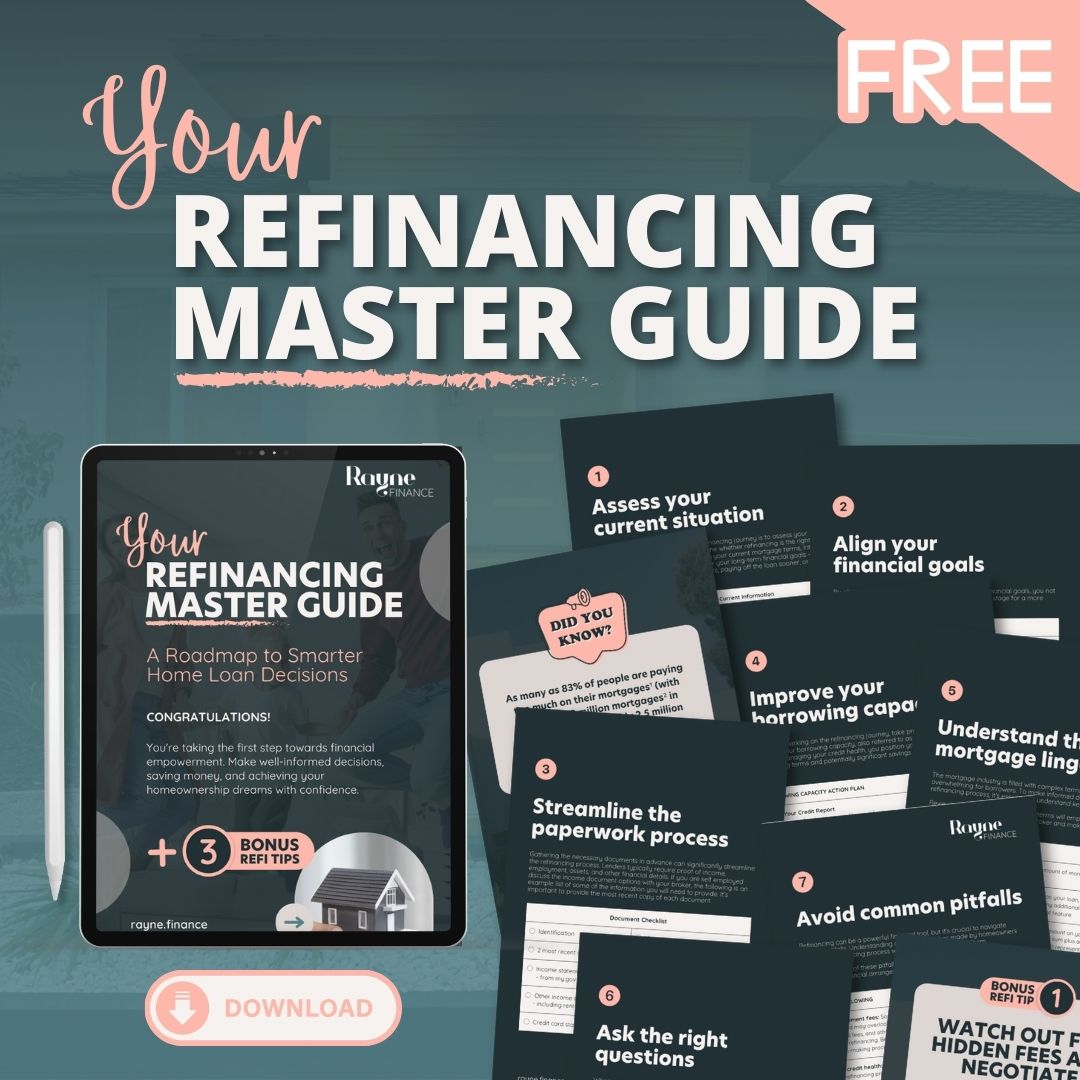As a homeowner with a mortgage, chances are you’ve heard of the term ‘refinancing’. But what does mortgage refinancing mean and how can it work for you?
Refinancing involves reviewing your current mortgage, and potentially swapping your loan to another lender, who can better meet your current needs, wants and circumstances.
Refinancing can be a strategy to secure a lower interest rate, switch to a different type of loan and can also allow you to consolidate your debts or pay down your mortgage more quickly.
Another common reason borrowers look to refinance is to access equity – the amount you’d get from selling your home after settling any associated loans and any other costs associated with the property.
However, refinancing isn’t suitable for everyone. There are many different factors you’ll need to consider when thinking about refinancing a loan.
So how will you know that refinancing is the right option for you?
The first step is to speak to a professional, such as a mortgage broker, about your needs, objectives, current financial situation and whether you can afford a different loan structure, particularly if you have more than one property.
Are you looking to pay less interest?
If your purpose of refinancing is to aim for a lower interest rate, this could potentially save you a lot of money in the long-term.
While saving money is often one of the biggest benefits of refinancing, it may not be as straightforward as that and careful consideration is required.
Sometimes refinancing may only save you a small amount per year, particularly when you take into consideration any exit costs, application fees and taxes involved. Refinancing may also not offer benefits if the loan will attract Lenders Mortgage Insurance (LMI) or features like an offset account aren’t offered with the new loan.
However, if it’s going to save upwards of $1,000 a year, refinancing might be a sensible approach.
At this point, the broker will need to find out about your existing loan, repayments and current loan structure.
Your mortgage broker will also need to find out more about your current financial situation, including your income, any other current debts and about any assets you own.
The current value of the property is also taken into consideration, your broker will have access to current data that will indicate what your property is likely to be worth.
The broker will then review the various loan options and figure out whether it’s worth it for you to refinance.
Your mortgage broker can tell you if getting a lower interest rate from your current lender can be achieved without refinancing.
Do you want to change your loan type?
Refinancing may allow you to change to a different loan type, for example switching from a variable loan to an interest only loan.
If you do decide to go down the refinancing path, working with a broker rather than going straight to a lender has advantages.
Brokers generally have access to loan options from a range of different lenders and if there’s a better opportunity for you, they’re usually able to access it.
Do you want to consolidate your debts?
If you want to refinance to lower lending costs to help you manage your monthly repayments, speak to your mortgage broker who can negotiate with your current lender for a rate suitable to your current situation.
Your broker can also help you look at alternative options to consolidate your personal loans and credit cards into the one loan. This could help you in lowering your monthly repayments, or help you keep your repayments on time, and even save you interest in the long term.
Licensing statement: Rayne Finance ABN [70 605 100 838] is authorised under LMG Broker Services Pty Ltd Australian Credit Licence 517192. Disclaimer: (1) As with any financial scenario there are risks involved. This information provides an overview or summary only and it should not be considered a comprehensive analysis. You should, before acting in reliance upon this information, seek independent professional lending or taxation advice as appropriate and specific to your objectives, financial circumstances or needs. This publication is provided on the terms and understanding that: (2) LMG Broker Services Pty Ltd, Rayne Finance (Seed Lending Pty Ltd) and the authors, consultants and editors are not responsible for the results of any actions taken on the basis of information in this publication, nor for any error in or omission from this publication. (3) LMG Broker Services Pty Ltd, Rayne Finance (Seed Lending Pty Ltd) and the authors, consultants and editors, expressly disclaim all and any liability and responsibility to the maximum extent permitted by the law to any person, whether a purchaser or reader of this publication or not, in respect of anything, and of the consequences of anything, done or omitted to be done by any such person in reliance, whether wholly or partially, upon the whole or any part of the contents of this publication.
Explore other FAQs and Facts
December cash rate on hold: 6 reasons to be optimistic about 2025
The Reserve Bank of Australia has kept the cash rate on hold once again, maintaining its cautious stance. While hopes for a rate cut remain unfulfilled, there are six reasons to stay optimistic, even as inflationary pressures and low productivity continue to shape the RBA’s approach to economic stability.
Australian properties see record profits in 2024
The 2023-24 financial year marked a milestone for Australian property sellers, with 96% of houses sold nationwide yielding a median profit of $326,000. This trend reflects the long-term value growth of homes, with capital cities and regional areas both benefiting from a robust market and rising property prices.
The pros and cons of rentvesting
With housing prices up 37.8% since 2020, many Australians face tough choices between renting in desirable suburbs or buying further from city centres. Rentvesting offers a middle ground—renting where you want to live while investing in an affordable property. This approach can build wealth but requires careful financial planning.
5 reasons why this might be a great time to buy
With Australia’s property market cooling, some may see now as an opportune time to buy. While timing the market is tricky, reduced competition, rising rental prices, and potential long-term gains could make this a strategic moment for both first-home buyers and investors to consider entering the market.
How to consolidate tax debt
Struggling with ATO tax debt? If you miss payments, the ATO may charge 11.36% interest on unpaid amounts. One option is to consolidate your tax debt into your home loan, potentially saving on interest, though refinancing costs apply. Speak with a mortgage broker to explore this option and avoid further penalties.
How is interest calculated on my home loan?
Mortgage interest is calculated daily based on the remaining principal, but the reduction of the principal isn’t linear. In the early years, a larger portion of each payment goes toward interest. However, by making additional repayments or using an offset account, you can reduce the principal faster and pay less interest over the life of the loan.
How do green home loans work?
As Australians seek to minimise their carbon footprint, green loans are becoming popular. These loans finance energy-efficient homes, renovations, and eco-friendly products like solar panels, EVs, and insulation. With potentially lower rates and flexible terms, green loans also boost property value, as sustainable homes attract more views and sell faster.
Dream Home Dilemma: Should You Build or Buy your home?
Deciding whether to build a new home or buy an established one is a major step in your homeownership journey. Each choice has its own set of pros and cons, from the opportunity to customise your space to the convenience of moving into an existing home. Understanding these differences can help you make the best decision for your future.
9 things to prepare before buying a home
To ensure a smooth property purchase, start by boosting savings and avoiding job changes three months before applying for pre-approval. Check your credit report for errors, consult a mortgage broker, and choose a conveyancer. Research locations, attend open homes, and arrange inspections. Contact me for expert guidance and loan pre-approval.
Your quick guide to guarantor home loans
Saving for a deposit can be challenging, but a guarantor home loan offers a solution. By having a guarantor, typically a parent or relative, cover part or all of the deposit, buyers could enter the property market sooner. With this support, you might qualify for a home loan with just 5% or even 0% savings.














